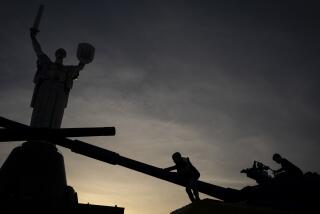Decades-Long Rivalry Fuels Iraq Crisis
- Share via
QALAAT CHOWLAN, Iraq — As he works a battery of satellite phones high in the mountains of Iraqi Kurdistan, Jalal Talabani looks like the winner in the latest struggle for control of the northern region of the country.
Yet with last weekend’s capture of the Kurdistan capital of Irbil, the military upper hand has gone to his soft-spoken rival, Masoud Barzani, whose sole satellite phone is often out of order.
Much is riding on the outcome of a decades-old feud between the two men. Their latest clash--over Irbil, which was held by Talabani’s Patriotic Union of Kurdistan for two years, until Barzani’s Democratic Party of Kurdistan joined forces with Iraq to seize the city last weekend--has already caused the launch of U.S. cruise missiles and mobilized troops in Iran, Iraq and Turkey.
Talabani charged this week that if Barzani’s forces win out, the 3.5 million Iraqi Kurds, impoverished and exhausted after years of anarchic guerrilla government in the wake of the 1991 Persian Gulf War, will be led into a period of markedly greater cooperation with the central government of Iraqi President Saddam Hussein. After the Gulf War, Iraqi tanks and helicopter gunships crushed a Kurdish uprising in the north and sent about 1 million Iraqi Kurds fleeing toward Iran and Turkey.
In his own headquarters 150 miles away, in a converted hotel on another ridge, Barzani this week did little to dispel an image of growing cooperation with Hussein after he called in the Iraqi army to back the offensive that captured Irbil.
“A big barrier has been lifted, between Iraq and us, between Iraq and the region,” Barzani told reporters as his tribal retainers listened respectfully.
But Talabani, taking a few puffs on a cigar and pacing between his desk and a military map that showed his latest setback, said Barzani’s bet on Hussein was a losing one.
“Politically, we win. Mr. Barzani has become a collaborator with Saddam Hussein. We will not permit Barzani to stay in Irbil. We are fighting him not as a Kurd but as a traitor,” Talabani said.
Iraqi Kurdish public opinion is divided about Barzani’s move. Virtually no one wants to return to living under Hussein’s thumb, but after recent years of Kurdish feuding and misrule, many ordinary people would welcome the stability a greater role for the central government would give.
Most Barzani supporters said they assume they will retain some autonomy in any new relationship with Iraq, but already there has been a shift in attitude in areas under Barzani’s control.
While the areas of Kurdistan still held by Talabani have an easygoing feel to them, those ruled by Barzani’s forces have already taken on an air of more rigorous government. Passport controls take longer, tolls are collected on roads, and travel passes are carefully checked.
If Barzani does not retreat from his alliance with the Iraqis, who have sent a mechanized battalion to dig in about 10 miles from Irbil, Talabani says he is ready to consider calling in aid from Iran.
“First we are asking our British and American friends, asking them to protect our people from Saddam. If they say no, then we will go to the devil himself,” Talabani said.
For his part, Barzani charges that his rival has already accepted military support from Iran.
An Iranian presence in Talabani’s area seemed confirmed when foreign reporters saw two unmarked Iranian-style all-terrain vehicles heading toward the front filled with men bearded in the style of the Iranian Revolutionary Guard. Soldiers from Talabani’s group who saw them said they were Iranians.
Ironically, both leaders blame the United States for their problems. Barzani says he lost patience after what he called American diplomatic neglect, while Talabani says that he was fooled by American assurances that Barzani would not be allowed to launch an attack against him.
Barzani seemed hopeful about a new round of American-sponsored talks with Talabani now that he has conquered two-thirds of northern Iraq, but Talabani did not hold out hope for political reconciliation between the two men.
“Instead of struggling for the overthrow of Saddam, he is working with him,” Talabani said.
*
But while the Iraqi Kurds pursue their factional feud, and while Iraq, Iran and Turkey maneuver for strategic advantage in northern Iraq, it is the Iraqi Kurds themselves who are suffering.
“For five years, we have been waiting for the United Nations, the United States. Nothing changed, nothing happened,” former agricultural engineer Abdurahman Sharif said in his central office in the Talabani-controlled city of Sulaymaniyah, noting that aid agencies have been pulling out as Hussein’s shadow lengthens.
“People are very poor. People are very tired. I am not interested in politics. We want to live,” he said.
More to Read
Sign up for Essential California
The most important California stories and recommendations in your inbox every morning.
You may occasionally receive promotional content from the Los Angeles Times.













